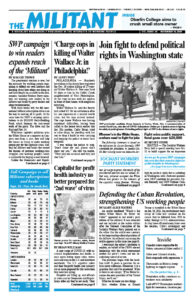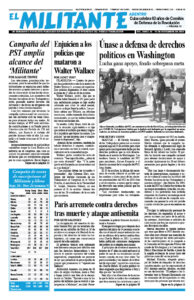A battle in the northern Ohio town of Oberlin with substantial stakes for working people has reached a new stage. Issues of wealth and power, class privilege and social standing are at its core.
On Nov. 10, a state appeals court in Akron, Ohio, will hear arguments in a protracted and costly legal battle waged by Oberlin College to drive the Gibson family and their small bakery in Oberlin out of business. Using the appeals process to keep alive their smear of the bakery owners as “racist,” the college administration and trustees are trying to reverse a $44 million judgment against the college won by the Gibson family in a unanimous jury verdict in June 2019. Under Ohio statutory limits, the trial judge reduced the judgment to $31.5 million.
A counter appeal by the Gibsons seeks reinstatement of the full $44 million in costs and damages originally awarded them by the jury. They argue that the statutory cap is unconstitutional.
During the trial the family won widespread support from working people in the region for standing up to the college, which dominates the small town. College authorities, and students who followed their lead, thought they could launch malicious attacks on the small-business owners with impunity. After the jury found against it, the college first demanded and failed to get a new trial, and then launched its appeal, dragging out legal proceedings in an effort to crush the family’s livelihood.
The case stems from a student’s attempt to shoplift from Gibson’s bakery on Nov. 9, 2016.
Allyn Gibson, a store clerk and the son and grandson of the owners, tried to stop a student who offered a fake ID to buy liquor and then attempted to steal bottles of wine. Outside, Gibson was set upon by the student and two friends. The three, all of whom are Black, later admitted to the theft in court and testified that no racism was involved in Gibson’s attempt to stop them stealing from the family’s business.
All three graduated from elite high schools and attended Oberlin College, where students pay $75,000 a year for tuition and housing. In 2017, the Grape, a student publication, ran an article, “The Culture of Theft,” on rampant shoplifting by students, acting out of a sense of entitlement, from town stores run by struggling business owners.
For two days after the shoplifting incident, college officials, led by Dean of Students Meredith Raimondo, helped orchestrate student protests calling for a boycott of Gibson’s bakery, and attempted to paint — without a shred of evidence — the three students as victims of racism, and the Gibson family as having a history of racial discrimination.
The college then cut business ties with the bakery, although the Gibsons had supplied the college cafeteria with baked goods for over a century without a single claim of discrimination being raised. College administrators demanded the Gibsons treat their students different than other youth in the town by calling college officials instead of police if their students were caught shoplifting.
In its brief to the court of appeals, the Oberlin College alleges the trial featured a “cascade of errors.” At issue, it claims, is “the principle that debate on public issues must be ‘uninhibited, robust and wide open.’” It says it had a duty to “respect the speech rights of its students.”
But the constitutional right to free speech was never an issue in the trial. The Gibsons sued the college, not the students, not for what it said, but its actions aimed at crushing the small business.
“Oberlin’s theory is that it has a license to defame without regard to how damaging and vicious the lie is as long as the defamatory statements are made in connection with a protest,” says the Gibsons’ brief to the court of appeals.
The school has tried to bolster its claim of defense of First Amendment rights by obtaining friend of the court briefs from the NAACP, various media and professional associations. But the briefs are notable for failing to address any of the issues argued in front of the jury during the trial.
College faces further challenges
This year Oberlin College has been beset by a series of other challenges of importance to working people and advocates of labor and democratic and human rights.
The school faces a lawsuit by Alice Blumenfeld, a former dance instructor who is suing for discrimination. She was employed as a visiting assistant professor of dance at Oberlin between 2018 and 2020, but was then denied a tenured position despite her qualifications. She says she was told, “We can’t just hire another white woman from the Midwest with a husband!” by Ann Cooper Albright, chair of the Oberlin dance department.
In February the college administration faced down protests by hundreds of students and workers over the layoffs of more than 100 campus workers, members of the United Auto Workers union. Erik Villar, chair of UAW Local 2192, noted that some of those sacked had worked there for over 30 years, as had some of their parents and grandparents.
While the college administration and trustees are out to break the Gibson family, they readily came to a monetary settlement last January with a former professor, Joy Karega. She promoted anti-Semitic conspiracy theories on her public Facebook site, which college administrators at first defended as a matter of free speech. She was dismissed in 2016 for refusing to cooperate with a college investigation into her conduct.
Last June, a federal appeals court reinstated a case in which a male student at Oberlin College charges that he was expelled in a rigged sexual assault hearing under rules that resulted in a 100% conviction rate. Dean Meredith Raimondo was the author of the rules and Title IX coordinator at the time.

